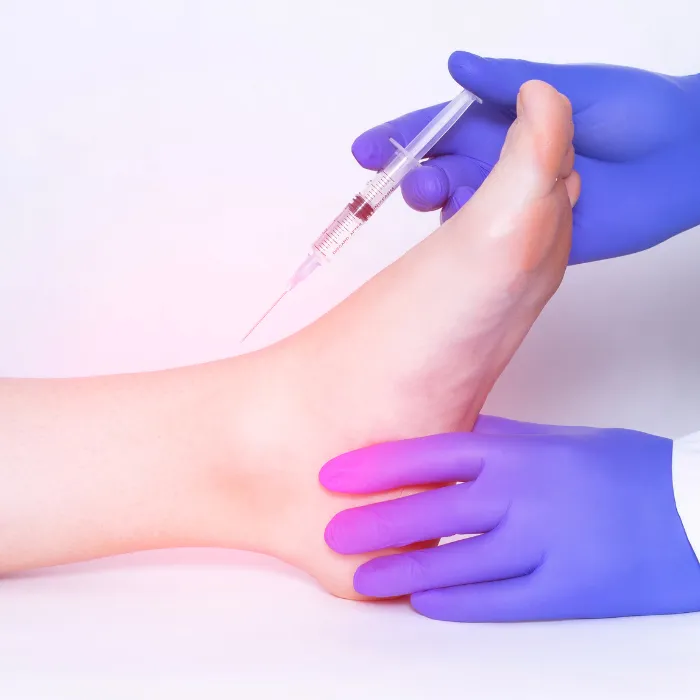Repair
Non-Surgical Foot & Ankle Treatments
Enhancing Recovery with Precision Injections
"The place where you made your stand never mattered,
only that you were there... and your still on your feet"
~ Stephen King ~
At Foot-Doctor Clinic, we offer targeted injection therapies for foot and ankle conditions, carefully designed to assist in recovery and effective pain management.
Steroid injections may be utiliSed to address acute inflammation, with the aim of providing relief for conditions such as plantar fasciitis.
In certain cases, hyaluronic acid injections can be administered to help improve joint lubrication and shock absorption, which may support the body’s natural healing processes in recovering from foot and ankle injuries.

The Procedure
What to Expect
At Foot-Doctor, we ensure that the injection process is meticulously executed with your safety and comfort as our top priority.
Post-procedure, many patients to observe an improvement in their symptoms, typically within days to weeks, though individual experiences may vary.
Your active participation in your personalised recovery plan is crucial to facilitate the best possible outcome. We're with you every step of the way.

Informed Consent
Understand Your Treatment
We prioritise a comprehensive consent process before proceeding with any treatment.
This includes a detailed discussion of the benefits, alternatives, potential risks, and required aftercare.
This is to provide you with the knowledge needed to make an informed decision.
Informed consent is collaborative— questions are encouraged to ensure you completely understand and are comfortable with the treatment plan.

Risks and Complications
Ensuring Patient Safety
Injections are widely considered safe, yet we believe it's crucial to communicate any potential risks involved.
With steroid injections, there's a small possibility of side effects such as skin discolouration, fat atrophy, or a temporary increase in pain.
Hyaluronic acid injections may lead to local reactions such as swelling or discomfort. We are committed to diligent follow-up care to manage any issues that may arise swiftly and effectively.
Steroid Injections
Steroid injections can be an effective treatment for short-term relief during flare-ups by reducing inflammation and associated discomfort. They are particularly beneficial in managing conditions such as plantar fasciitis and Morton's neuroma, providing significant alleviation for many patients.
Nevertheless, while steroids are advantageous for acute inflammation, their use must be approached with caution, particularly if multiple doses are required over time. We prioritise patient safety and ensure that the advantages and risks are meticulously considered, as repeated steroid use carries a small, yet significant risk of complications, including plantar fascia or Achilles tendon rupture.
In the management of foot and ankle conditions, steroid injections are integrated into a comprehensive care plan that may encompass physical therapy, orthotic support, and lifestyle adjustments, amongst other treatments. This multidisciplinary approach aims not only to address the immediate symptoms but also to foster long-term musculoskeletal health.
Through monitoring of the treatment response and making adjustments as necessary, we endeavour to optimise the healing process whilst minimising potential adverse effects. Patient education is paramount in this process; we provide thorough information about the nature of the injection, what to anticipate during recovery, and how to recognise and report any unusual symptoms promptly.

A significant concern with repeated steroid injections is the potential for cartilage damage. Steroids can be chondrotoxic, which means they may harm cartilage cells.
This risk is especially pertinent in joints experiencing early-stage arthritis. In such cases, there's a possibility that steroid injections might exacerbate arthritic changes, potentially leading to increased disability.
If there is concern about potential cartilage damage, it is vital that your doctor discusses these alternatives with you, taking into account your specific circumstances. Imaging, such as MRI or ultrasound, may be recommended to provide a clearer picture of your condition, which can guide more precise and tailored treatment choices.
Frequent injections can also lead to fat pad thinning or atrophy, particularly in the heel and the ball of the foot. This can result in reduced cushioning, and consequently, patients may experience increased discomfort due to the closer proximity of bone to the floor during weight-bearing activities.
In light of these risks, it's important to know that there are other proven alternative non-surgical treatments available.
At Foot-Doctor our approach to the use of steroid injections is within the context of a broader, carefully considered management strategy with your long-term health and well-being in mind.
Hyaluronic Acid Injections

For patients experiencing joint pain in the foot and ankle, hyaluronic acid (HA) also known as viscosupplement, injections offer a non-surgical treatment option to alleviate discomfort and improve joint function. HA, a natural component of joint fluid, can augment the joint's lubrication, facilitating smoother movements and potentially protecting the cartilage.
The role of hyaluronic acid in the repair process is multifaceted. It is a gel-like substance, found in high concentrations in our joints, functions as a lubricant and shock absorber, essential for cushioning weight-bearing joints like the ankle.
By augmenting the natural viscous synovial fluid, the lubrication of the joint is maintained facilitating smoother joint movements which can help to reduce friction and wear on the cartilage and other joint structures. This can alleviate pain and improve function, potentially delaying the progression of degenerative joint conditions.
These injections help to provide shock absorption for joint loads, which can be particularly beneficial in managing conditions such as ankle osteoarthritis.
Research suggests that hyaluronic acid injections can provide longer-lasting symptom relief compared to steroid injections. Moreover, some studies indicate that hyaluronic acid may be effective in the short term for conditions like ankle osteoarthritis, making it a valuable option for patients seeking non-surgical treatment alternatives.
Indications for HA injections include osteoarthritis and hallux rigidus, where evidence shows they can improve gait pain and joint function, and might be especially beneficial for early-stage arthritis to avoid or delay surgery. When combined with adjuncts like orthotics, they can offer comprehensive care.
Patients often report improvement within days to weeks, with results that can last several months. It's important for individuals to follow a personalised recovery plan to achieve optimal results. Our approach is to integrate HA therapy at the right time in the treatment timeline to maximise benefit while preserving joint health.
Other Options
An alternative such as Platelet-Rich Plasma (PRP) injections may be considered.
PRP therapy uses a concentration of a patient's own platelets to promote healing of injured tendons, ligaments, muscles, and joints.
This method leverages the body's own healing mechanisms, as platelets release growth factors that initiate the healing process and attract stem cells.

Complete Care
Navigate you personal health landscape, selecting the diagnosis and treatment combination, timeframe, and price point that aligns with you individual circumstances and goals.
Disclaimer
This content is intended for general informational purposes only. It should not be used to replace the advice of a medical practitioner. All specific individual patient information should be discussed with their doctor or other healthcare professionals. The content should not be used to self-diagnose or self-medicate any condition and should not substitute professional medical advice, diagnosis, or treatment. If you have any questions or concerns about your health, please contact your doctor or other healthcare professional.
© 2024 Foot-Doctor, All Rights Reserved.

